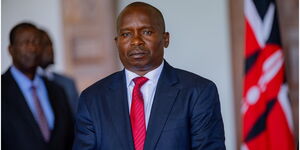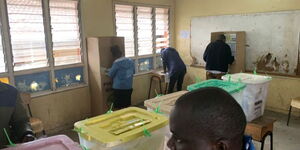Just as the country is reeling from the revelation that free education might no longer be offered, the Kenya National Union of Teachers (KNUT) has warned of a nationwide teachers’ strike.
KNUT Secretary General Collins Oyuu, on Friday, July 25, warned of an imminent strike if the government fails to honour the recently signed Collective Bargaining Agreement (CBA) between the Teachers Service Commission (TSC), KNUT, the Kenya Union of Post Primary Education Teachers (KUPPET), and the Kenya Union of Special Needs Education Teachers (KUSNET), which promised increased salaries for teachers.
Under the new deal worth Ksh33 billion, teachers in the highest job group (D5) are set to earn up to Ksh167,415, marking a five per cent salary increase.
The new salaries were the result of day-long crunch talks between TSC and the two teachers’ unions at the Kenya Institute of Special Education in Kasarani on Friday, July 18. In the meeting, union leaders and government representatives agreed on a 29.6 per cent increase for the lowest-paid teachers.
Under the deal, the lowest-paid teacher, currently earning around Ksh23,000, will see their pay rise to about Ksh29,000.
The increment was to be implemented gradually, with the agreement projecting an annual salary adjustment budget of Ksh8.4 billion yearly, totalling Kshh33 billion at the end of the five-year cycle, which ends on June 30, 2029.
However, the implementation of the new CBA was set to begin immediately, with teachers expected to receive revised paychecks by the end of this month.
At the same time, Oyuu criticised the government over the plan to discontinue free education, noting that the problem was rooted in the capitation to schools, further challenging Members of Parliament to address the issue in Parliament.
On Thursday, July 24, Treasury Cabinet Secretary John Mbadi announced that the government could no longer afford to provide free primary and secondary education.
Appearing before the National Assembly committee on July 24, the CS claimed that free basic education was no longer sustainable, citing the increased number of students in schools and constrained fiscal resources.
He also said that the capitation grant for secondary schools would now be Ksh16,900 per child, down from Ksh22,244.
"Currently, learners are provided with tuition and operational costs at the rate of Ksh1,420 for primary education. For junior school, it is Ksh15,042 per child, and in senior secondary school, it is Ksh22,244 per child," he stated.
"However, due to constrained fiscal space and other emerging priorities within the education sector, updating these rates might be untenable. The government will, however, consider reviewing this rate should revenue performance improve."












